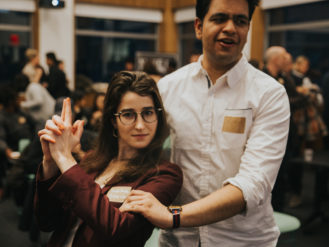Inside the Startup Lab Inventing the Future of Cities
At Urban-X in Brooklyn, eight teams of entrepreneurs work feverishly to create their products and hone their pitches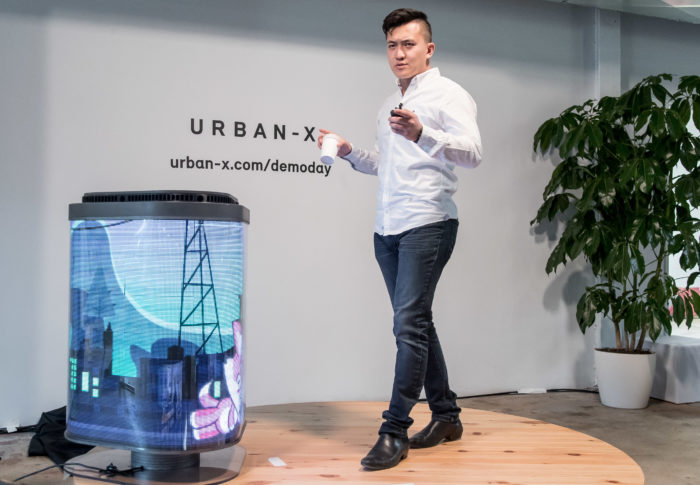
Sencity's Steven Bai presents his idea for a digital trash can to keep cities clean (Photos courtesy of Urban-X)
In a renovated warehouse in Greenpoint, the future of cities is unfolding. Sometimes the future looks kind of wacky. One day recently, Steven Bai, a founder of startup Sencity, was practicing his pitch about digitally equipped trash cans that play interactive games with passers by. The slide show behind Bai illustrated the problem he aims to solve: a New York City metal trash can, overflowing and off-putting. Next slide: shiny, illuminated TetraBIN trash cans that reward the experience of putting litter in its place. “Imagine if we could have them in schools,” said Bai. “Kids would be so happy.”
A mentor stood by to review Bai’s pitch. “What I like about this presentation is that you stay away from platitudes, until the very end,” said Micah Kotch, managing director of Urban-X, a new-business accelerator that moved recently from Manhattan to a new complex in Greenpoint. “We are looking at how do you build more livable, loveable cities. It’s technology that supports humans, to make cities better.”
The Urban-X method is to select a group of eight early-stage companies and give them three months of intensive mentoring in design, engineering, marketing, and business-model development, as well as startup funding. “We’re taking the Iron Man approach to technology,” said Kotch. When I visited Urban-X on a bright, sunny afternoon, the current class of entrepreneurs were working feverishly at their computers and in small groups to prepare their pitches to investors and the media at a forthcoming demo day. Dressed in jeans and T-shirts, they sat in bunches along long rows of tables in the cavernous room with soaring ceilings, a few drinking beer out of tall cans (it was a Friday, after all).
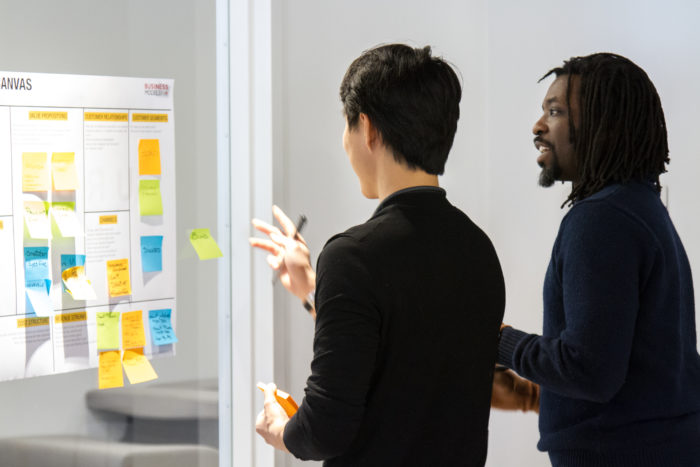
Urban-X sorts its mentoring into areas of design, engineering, and business development
Urban-X is a venture of MINI, the wee-car division of BMW and a “quintessentially urban” firm, Kotch said. MINI has an interest in making cities better and, thereby, creating a more vibrant market for its drivers. “We think cities today face an unprecedented amount of society-scale challenges,” Kotch said, “in mobility, environmental, social. A critical element in facing those challenges is entrepreneurs. We’re committed to helping these entrepreneurs bring their ideas to life.” MINI’s partner in Urban-X is SOSV, the venture-capital firm of New York City native Sean O’Sullivan. SOSV has invested in more than 500 startups around the world.
Urban-X moved to its new home in Brooklyn, Kotch said, because the borough has become a hub of design, creative and tech fields. “Brooklyn is an ideal place to have those positive collisions of people shaping the future of the city.” Silicon Valley is different, he observed. “First of all, Silicon Valley is not a city. You have a lot of solutions coming out of the valley that put the human in the backseat, and put the machine first,” said Kotch, who might be biased, since he’s a native of Park Slope, and an enthusiastic amateur historian on the shipping and industrial history of his current workplace in Greenpoint.
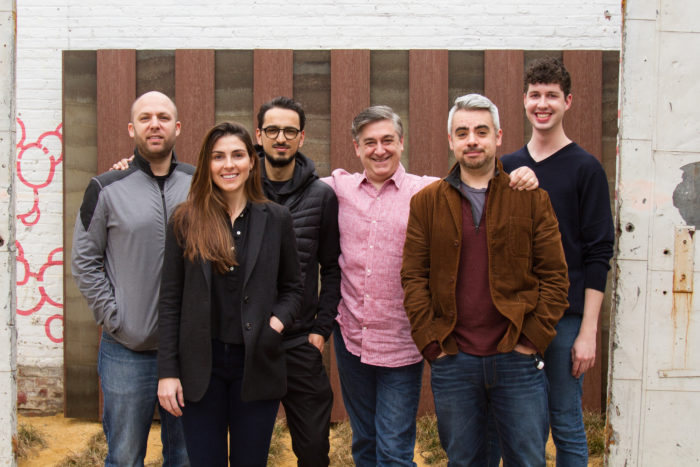
Urban-X managing director Kotch, left, and members of his team
Urban-X is housed in a 23,000-sq.-ft. complex called A/D/O, the converted warehouse that’s also home to a design-centered co-working space, a welcoming restaurant and coffee shop called Norman, a shared open public workspace, and a back garden. The name A/D/O is a sly historical allusion to MINI’s origins as a British carmaker, which had its own design lab (a secret one at the time) called the Amalgamated Drawing Office, or ADO.
Urban-X has been productive in its short life. The accelorator has helped launch a company called Farmshelf, which uses sensors and software to create produce-growing units suited specifically to homes and offices. The latest Urban-X cohort, its third group of eight companies, includes a startup called 0202, which is creating an air-filtration face mask for urban dwellers. “New York isn’t a Shanghai or Stuttgart or London,” in terms of air pollution, Kotch said, but air pollution globally is on the rise, and a growing issue for urban pedestrians and cyclists. Current face masks “haven’t been updated since the 1960s,” Kotch said. Another startup is Envairo, which is producing software that can tell companies how many people are in a space at a given time using existing thermostats, saving companies 10% to 20% on heating and cooling costs, the company says.
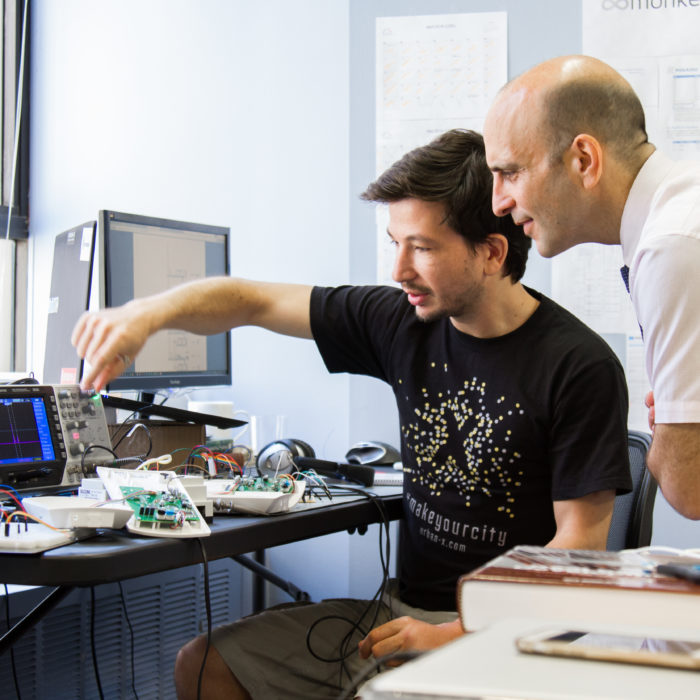
Part of the rationale of gathering the startups is to provide feedback and cross-pollination among the groups
Part of the purpose of throwing eight little companies together is the feedback they generate for one another. When Bai showed his animated trash cans, the audience of other Urban-X founders peppered him with comments and suggestions before they took their own turns at presenting. Urban-X wants to ask the “right questions,” Kotch said, and to probe answers among the intersections of investors, policy makers, and the creative community. “If you can take these assets and use them to solve problems around cities, and make cities better,” Kotch said, “well, that’s really exciting work.”





